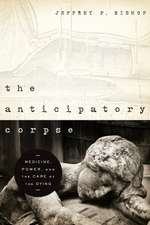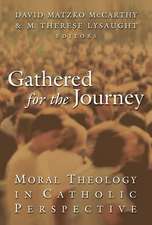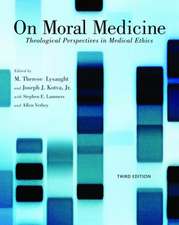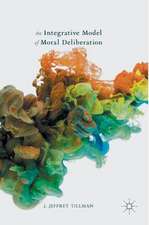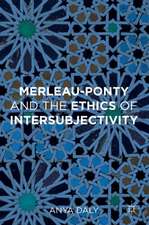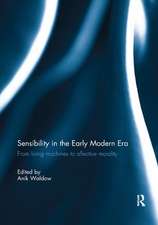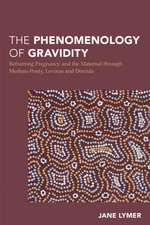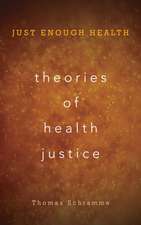Biopolitics After Neuroscience: Morality and the Economy of Virtue
Autor Jeffrey P. Bishop, M. Therese Lysaught, Andrew A. Michelen Limba Engleză Paperback – 27 dec 2023
| Toate formatele și edițiile | Preț | Express |
|---|---|---|
| Paperback (1) | 192.64 lei 6-8 săpt. | |
| Bloomsbury Publishing – 27 dec 2023 | 192.64 lei 6-8 săpt. | |
| Hardback (1) | 541.28 lei 6-8 săpt. | |
| Bloomsbury Publishing – 15 iun 2022 | 541.28 lei 6-8 săpt. |
Preț: 192.64 lei
Preț vechi: 250.07 lei
-23% Nou
Puncte Express: 289
Preț estimativ în valută:
36.87€ • 38.03$ • 31.20£
36.87€ • 38.03$ • 31.20£
Carte tipărită la comandă
Livrare economică 04-18 martie
Preluare comenzi: 021 569.72.76
Specificații
ISBN-13: 9781350288485
ISBN-10: 1350288489
Pagini: 304
Dimensiuni: 156 x 234 x 25 mm
Greutate: 0.4 kg
Editura: Bloomsbury Publishing
Colecția Bloomsbury Academic
Locul publicării:London, United Kingdom
ISBN-10: 1350288489
Pagini: 304
Dimensiuni: 156 x 234 x 25 mm
Greutate: 0.4 kg
Editura: Bloomsbury Publishing
Colecția Bloomsbury Academic
Locul publicării:London, United Kingdom
Caracteristici
Connects neuroscientific claims to neoclassical economics and colonial moral anthropology
Notă biografică
Jeffrey P. Bishop is Professor of Philosophy and Professor of Theological Studies at Saint Louis University, USA, where he also holds the Tenet Endowed Chair in Bioethics. M. Therese Lysaught is Professor at the Neiswanger Institute for Bioethics and Healthcare Leadership at Loyola University Chicago, Stritch School of Medicine, USA. Andrew A. Michel is Associate Professor of Psychiatry at the Thomas F. Frist, Jr. College of Medicine at Belmont University, USA.
Cuprins
Introduction: The Age of the BrainPrelude to a Neuroscience of Morality: Of Sciences and Social Imaginaries Part I: The Neuroscientific Narrative of Morality 1. The Neuroscientific Narrative of Vice2. The Neuroscientific Narrative of Virtue 3. Popular (Neuro)Science and Other Political Economy Schemes Interlude Between Neuroscience and Economic Science: Of Capitalists and Criminals Part II: The Evolution of an Artifactual Being4. The Neoliberal Narrative of Morality5. Springs of Action and the Political Management of the Poor6. Bacon, Smith, and the End of VirtueConcluding Un(neuro)scientific Postlude: Between Beasts and Angels Index
Recenzii
This book is a tour de force, offering a detailed analysis of the neuroscience of morality in relation to neoliberal economic thought. It is both a provocative critique of current neuroscience and a call for a more humane cultural conversation about what it means to be human. It will be essential reading for anyone interested in the wider philosophical, theological or ethical implications of neuroscience.
A perceptive and illuminating work. Hidden within the technical theories of neuroscience, Bishop, Lysaught and Michel, uncover a moral language with disturbing implications for race, poverty, and many other areas of urgent political concern. It turns out much of what claims to be a "science" of the brain is, in fact, ideology.
Hypothesizing originally that neuroscience could be adduced to complicate virtue ethics, the authors discovered instead the embeddedness of neoliberal drivers and norms in the field itself. Deeply researched, immensely thoughtful and beautifully written, this work is a major contribution to understanding how the sciences mirror rather than bracket social and political principles of an age.
Neuroscience promises to unlock the secrets of the brain and release powerful forces for healing and well-being, albeit at the cost of erasing free will and moral responsibility. Biopolitics after Neuroscience powerfully traces the roots of this project in a social imaginary spawned by eighteenth-century political economy, linked with the rise of utilitarian moral theory, and bound up with policing the "undeserving" poor. The brain is imagined as a new invisible hand, the secrets of which can be unlocked through neuroscience and directed toward the formation of maximally efficient, productive economic citizens. Bishop, Lysaught and Michel's bold analysis should give readers pause about jumping on this latest Big Science bandwagon.
This is the sort of volume I have eagerly awaited. The authors skillfully describe how neoliberal values have shaped neuroscientific research. However, their argument transcends this specialty. After this book, no discipline-academic or otherwise-can afford to ignore how its practitioners may unknowingly serve their political and economic masters.
This book is a necessary read for anyone interested in theological ethics, bio-ethics, or the neurosciences. Bishop et al. weave a complex yet clear narrative of the underlying anthropologies which govern the contemporary political economy and its relation to the neurosciences.
A perceptive and illuminating work. Hidden within the technical theories of neuroscience, Bishop, Lysaught and Michel, uncover a moral language with disturbing implications for race, poverty, and many other areas of urgent political concern. It turns out much of what claims to be a "science" of the brain is, in fact, ideology.
Hypothesizing originally that neuroscience could be adduced to complicate virtue ethics, the authors discovered instead the embeddedness of neoliberal drivers and norms in the field itself. Deeply researched, immensely thoughtful and beautifully written, this work is a major contribution to understanding how the sciences mirror rather than bracket social and political principles of an age.
Neuroscience promises to unlock the secrets of the brain and release powerful forces for healing and well-being, albeit at the cost of erasing free will and moral responsibility. Biopolitics after Neuroscience powerfully traces the roots of this project in a social imaginary spawned by eighteenth-century political economy, linked with the rise of utilitarian moral theory, and bound up with policing the "undeserving" poor. The brain is imagined as a new invisible hand, the secrets of which can be unlocked through neuroscience and directed toward the formation of maximally efficient, productive economic citizens. Bishop, Lysaught and Michel's bold analysis should give readers pause about jumping on this latest Big Science bandwagon.
This is the sort of volume I have eagerly awaited. The authors skillfully describe how neoliberal values have shaped neuroscientific research. However, their argument transcends this specialty. After this book, no discipline-academic or otherwise-can afford to ignore how its practitioners may unknowingly serve their political and economic masters.
This book is a necessary read for anyone interested in theological ethics, bio-ethics, or the neurosciences. Bishop et al. weave a complex yet clear narrative of the underlying anthropologies which govern the contemporary political economy and its relation to the neurosciences.



